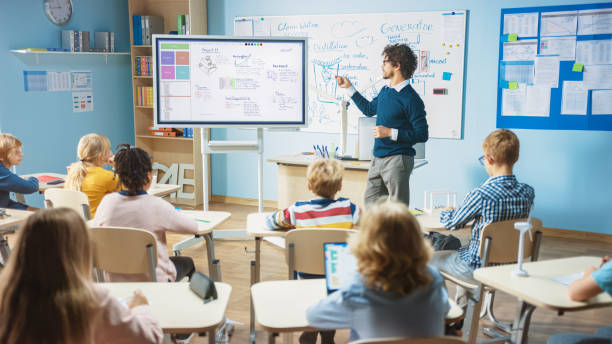Expert Primary Science Tuition Singapore for Understanding Complex Concepts
Expert Primary Science Tuition Singapore for Understanding Complex Concepts
Blog Article
Discover the Vital Benefits of Understanding Main Science for Young Students
The importance of key scientific research education for young learners expands much beyond mere understanding acquisition; it acts as a basic column in establishing crucial abilities such as crucial reasoning, analytical, and creativity. Involving with clinical concepts with inquiry-based and interactive tasks not only cultivates inquisitiveness but also prepares for durable, confident students. As we discover these benefits further, it becomes clear that the ramifications for future scholastic and individual development are profound. What details methods can teachers employ to optimize these benefits?
Enhancing Crucial Thinking Skills
Cultivating important believing abilities in young learners is necessary for their cognitive development and future scholastic success. Essential reasoning makes it possible for youngsters to evaluate information, assess evidence, and make notified decisions, which are vital abilities in today's information-rich culture. By participating in scientific inquiry, young students can boost these abilities as they discover principles with monitoring, thinking, and trial and error.
In primary scientific research education, teachers can facilitate vital thinking by urging students to ask questions, formulate hypotheses, and perform experiments. This hands-on technique permits kids to exercise analytical and develop rational reasoning skills. When students investigate the buildings of materials or the principles of movement, they discover to evaluate their findings seriously and attract conclusions based on proof.
Furthermore, discussions and collective tasks can advertise essential thinking by supplying possibilities for students to verbalize their thoughts, difficulty assumptions, and take into consideration diverse perspectives. By producing a helpful setting that values query and reflection, instructors can support vital believing skills that equip young students to end up being long-lasting students and independent thinkers. Eventually, boosting these abilities lays a durable structure for their future scholastic undertakings and individual growth.
Promoting Interest and Expedition

Key science education and learning gives a structured setting where young learners can discover numerous phenomena with hands-on experiments and observations. By permitting them to engage with materials and participate in inquiry-based discovering, instructors create opportunities for kids to develop hypotheses, test their concepts, and draw verdicts. Such experiences support a sense of wonder and excitement regarding science.

Building Confidence in Problem Fixing
Structure confidence in problem-solving is a vital element of key scientific research education that encourages young learners to come close to obstacles with strength and imagination - primary science tuition Singapore. They create necessary abilities in crucial reasoning and evaluation when kids are encouraged to engage with clinical principles through hands-on tasks and inquiry-based learning. This procedure not just improves their understanding of clinical concepts however additionally fosters a sense of ownership over their discovering
To develop confidence, instructors need to create an encouraging setting where errors are seen as chances for growth instead of failures. This urges trainees to take risks and discover different solutions to issues. By giving scaffolding and support, educators can assist pupils browse intricate tasks, gradually boosting their independence in problem-solving scenarios.
In addition, collective knowing experiences, such as group tasks or experiments, can further improve trainees' confidence as they find out to express their ideas and listen to others' point of views. These communications support social skills and enhance the concept that problem-solving is commonly a cumulative endeavor. Eventually, growing self-confidence in analytic prepares young students for future academic obstacles and equips them with the tools essential for lifelong knowing.
Motivating Imagination and Advancement
In the world of main science education and learning, motivating creative thinking and technology is necessary find here for growing a vibrant knowing setting. By fostering a culture where young learners can explore concepts and experiment freely, educators help students develop essential assuming skills and a passion for exploration. Imagination in scientific research urges kids to ask inquiries, devise theories, and participate in hands-on activities that boost their creativity.
Integrating flexible projects and inquiry-based discovering into the curriculum enables students to express their special perspectives and remedies. When entrusted with fixing a trouble related to their atmosphere, pupils can conceptualize several techniques, leading to creative results that showcase their creativity. This not just deepens their understanding of scientific principles but additionally infuses a feeling of ownership over their learning process.
Additionally, imaginative science education and learning nurtures cooperation among peers, as pupils frequently share concepts and improve each other's understandings - primary science tuition Singapore. This collective spirit advertises not click for more just innovation however additionally vital social abilities. Therefore, by focusing on imagination and technology in key science education, we equip young students to think critically, accept obstacles, and envision opportunities, laying a solid structure for lifelong understanding and expedition
Preparing for Future Knowing Challenges
Young students' capability to navigate future knowing difficulties hinges on a strong foundation in key scientific research education. This foundational understanding furnishes trainees with vital thinking abilities and a systematic strategy to analytic, necessary for taking on complicated concerns in an ever-evolving globe. Key science promotes inquiry-based understanding, motivating pupils to ask questions, discover hypotheses, and take part in hands-on experiments.
As they create these abilities, students come to be proficient at assessing information, identifying patterns, and attracting notified conclusions. Such competencies are crucial not only in clinical areas yet likewise in design, modern technology, and mathematics (STEM), where interdisciplinary expertise is increasingly crucial.
In addition, primary scientific research education grows a sense of interest and resilience in young students, enabling them to view difficulties as chances for development. As they run into and conquer obstacles in their scientific explorations, they construct confidence in their capability to adjust and innovate.
Inevitably, a solid foundation in primary scientific research not only prepares young learners for scholastic quests however also furnishes them with the tools required for lifelong understanding and versatility in a swiftly altering international landscape. By spending in main science education and learning, we are investing in the future potential of our students.
Conclusion
Recognizing key science is essential for young learners, as it promotes essential reasoning, interest, and creativity. Involving with clinical concepts through hands-on experiments improves analytic capacities and develops durability. This foundational understanding not only equips pupils to evaluate data and recognize patterns yet likewise nurtures an inquiry-based way of thinking. Ultimately, the advantages of key science education prepare kids for future scholastic searches and infuse long-lasting knowing routines crucial for flourishing in an ever-evolving world.
The value of primary science education and learning for young students extends far beyond mere expertise purchase; it serves as a basic pillar in establishing essential skills such as crucial check it out thinking, problem-solving, and creative thinking. By producing a supportive atmosphere that values inquiry and reflection, instructors can support critical assuming abilities that empower young learners to become independent thinkers and lifelong students. Thus, by prioritizing creativity and innovation in key science education, we encourage young students to assume critically, welcome challenges, and envision opportunities, laying a solid structure for lifelong learning and expedition.
Young students' capability to browse future discovering challenges pivots on a solid foundation in key science education and learning.Comprehending primary scientific research is important for young students, as it fosters essential thinking, interest, and imagination.
Report this page